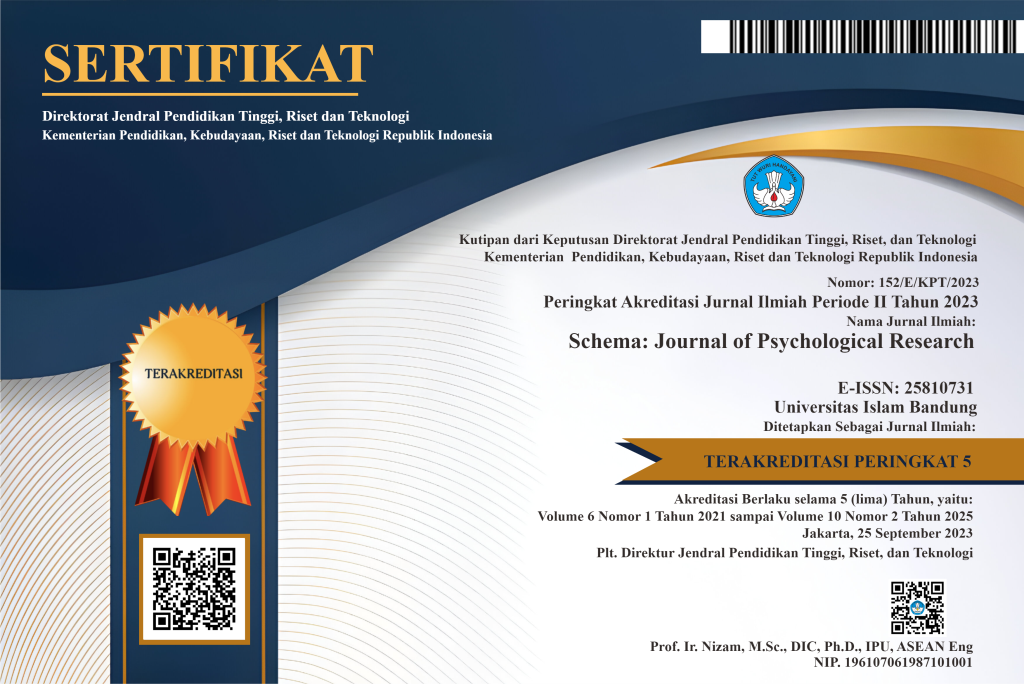Kebahagiaan Pada Individu Yang Mengalami Low Vision: Suatu Studi Deskriptif di Yayasan Syamsi Dhuha Kota Bandung
Abstract
Low Vision means that someone whose having avision dysfunction despite treatment; Has avisual acuity less than 6/ 18 until it can receive light perception; Broad vision of less than 10 degrees from the fixation point; their potential can still use the remaining vision for the planning and or execution of a task. Physical barriers to be one factor that can inhibit the individuals in fulfilling the development task. If the individual can not fulfill the development task, then that individual will feel the unhappy. Different conditions occurin individuals who have low vision in Syamsi Dhuha Foundation showed positive emotions or happiness in the face of the ‘problematic’ and physical limitations. By using questionare of happiness by Martin E.P. Seligman (2005) to 10 individuals who have low vision, obtained results indicate that in general subjects feel happiness.
30% of the subjects feel the happiness in their pass life, 90% of the subjects feel happy in the present, and 90% of the subjects felt the optimistic in the future.
Subject who happy in today life has been using signature strengths and life satisfaction. Subjects to feel optimistic about their future of life does have the power of hope that leads subjects to feel positive felling about the future. Subjects who was unhappy about their past as the subject who does not build up maximum strength of forgiving power and grateful.
Keywords
Full Text:
PDF (Bahasa Indonesia)References
Arikunto, Suharsimi. 2000. Manajemen Penelitian. Edisi Baru. Yogyakarta: Rieneka Cipta
Guilford, J.P. 1979. Psyvhometric Methods. Tata McGraw-Hill Publishing Company Limited.
Hurlock, Elizabeth. 1980. Psikologi Perkembangan: Suatu Pendekatan Sepanjang Rentang Kehidupan. Jakarta: Erlangga
Mangungsong, dkk. 1998. Psikologi dan Pendidikan Anak Luar Biasa. Jakarta: LPSP3 Universitas Indonesia
Noor, Hasanuddin. 2009. Psikometri Aplikasi Penyusunan Instrumen Pengukuran Perilaku. Bandung: Fakultas Psikologi UNISBA
Seligman, E. P Martin. 2005. Authentic Happiness. Jakarta. Mizan
Siegel, Sidney. 1986. Statistik Non Parametrik: Untuk Ilmu-Ilmu Sosial. Jakarta: Gramedia
Sudjana.1996. Metoda Statistika. Bandung: Tarsito
Sumber Internet:
Colenbrander, August. 2000. Disability Evaluation-Vision. http://docs.google.com. Diakses tanggal 3 Oktober 2010
Nawawi, Ahmad. 2010. Pendidikan Inklusif bagi Anak Low Vision. http://docs.google.com. Diakses tanggal 3 Oktober 2010
Nurmatari, Avitia. 2009. Masyarakat Indonesia Belum Tahu Cara Merawat Mata. http://bandung.detik.com. Diakses tanggal 4 Oktober 2010
Persatuan Tunanetra Indonesia, 2008. Pusat Layanan Low Vision. http://pertuni.idp-europe.org/index.php. Diakses tanggal 4 Oktober 2010
Seligman, E. P Martin. 2006. Authentic Happiness. www.authentichappiness.sas.upenn.edu. Diakses tanggal 10 September 2010
Widodo, Dwi Putro. 2007. Mata, Kecerdasan, dan Lutein. http://ngersi.multiply.com. Diakses tanggal 10 September 2010
DOI: https://doi.org/10.29313/schema.v0i0.2421
Refbacks
- There are currently no refbacks.
Indexed by:
This work is licensed under a Creative Commons Attribution-NonCommercial-ShareAlike 4.0 International License.












